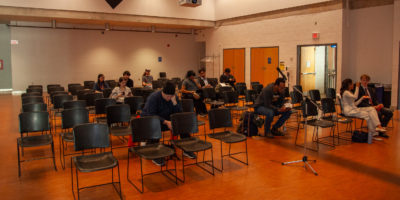By Lisa Urbach
Ryerson professors are struggling to stay afloat amid a sea of e-mails they receive from their students on a regular basis.
“We need to take a long, hard look at student access to faculty via e-mail,” Carla Cassidy, the dean of arts, told the Academic Council meeting last month, adding that “It has become an enormous workload for faculty. Two hundred students firing off questions is simply unmanageable.”
Layalee Faraj, a human resources management student, relies on e-mail because office hours aren’t always convenient and telephone tag can carry on past deadlines.
“E-mail is my preference because it is fast. Professors can respond to me anytime,” she said. “With the telephone, it is hard to connect.”
But while e-mail may be convenient for students, professors say it is impossible for them to balance it with their heavy workload. The current volume of e-mails from students has added two hours to professors’ already busy schedule and as they struggle to respond in an appropriate time frame, some students do not receive any response to their e-mailed inquiries.
“E-mail has become a problem because class sizes are increasing. At one point this semester I had over 800 messages in my inbox. I have not gotten it down to 400,” said politics professor Greg Inwood. “The volume is impossible to deal with and the students complain. I want to be accessible, but the technology has made it more difficult for me to service my students.”
Arne Kislenko, a history professor, said he receives 120 e-mails a day during exam periods or when essays are due. He said he sends an hour and a half responding and admits it’s impossible to get through all of the e-mails he receives.
He thinks e-mail access is abused because students use it instead of dropping by during office hours.
“Students should get over their fear or intimidation of approaching professors,” he said. “Professors aren’t as monstrous as they may seem and it is more helpful for students if they come in to see their professors rather than rely on e-mail.”
Inwood said the poor e-mail responses students have been receiving from their professors is also a result of the cuts made to support staff.
“Cost cutting has had damaging consequences on educational services. The downloading of additional responsibilities, such as photocopying, onto the faculty has contributed to the current situation.”
Nora Farrell, the ombudsperson for Ryerson, said students need to be patient and use e-mail appropriately.
“Students cannot expect immediate responses to their e-mails, especially if their questions are complex. Instead, both parties need to be mindful of higher and lower priorities and learn to use e-mail so it doesn’t disadvantage others.”
Farrell proposed improving this situation by using an automatic response mechanism that would inform students that their professors have received their e-mail and provide a realistic date by which they can expect a reply.
Both she and Inwood hope this will meet students’ needs and alleviate some of the pressures placed on faculty.









Leave a Reply